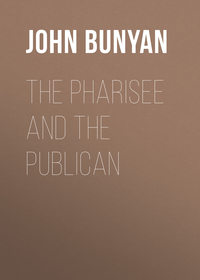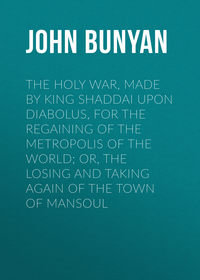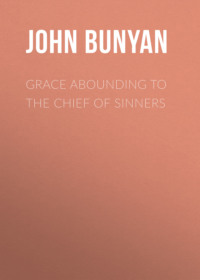 полная версия
полная версияThe Pilgrim's Progress by John Bunyan Every Child Can Read

John Bunyan
The Pilgrim's Progress by John Bunyan
PREFACE
It may seem a very bold undertaking to change even a word of the book which, next to the Bible, has been read by more people, old and young, than any other book in the English language.
But, it must be remembered that, although the Pilgrim's Progress has come to be a children's book, and is read more often by young people than by those who are older, it was not in the purpose of John Bunyan to write a book for children or even for the young.
The Pilgrim's Progress was a book for men and women; and it was aimed to teach the great truths of the gospel. Hence while most of it is written in a simple style, – as all books should be written, – it contains much that a child cannot understand; not often in the story, but in the conversations and discussions between the different persons. Some of these conversations are in reality short sermons on doctrines and teachings which Bunyan believed to be of great importance. But these are beyond the minds of children and give them great trouble when the book is read. They do not like to have them left out of the reading, thinking that they may lose something interesting. Many a young person has stumbled through the dull, doctrinal parts of the book, without understanding them; and even grown people find them in our time somewhat of a blemish upon the wonderful story, valuable as they were supposed to be in Bunyan's own time.
For many years it has been in my mind, not to re-write the Pilgrim's Progress, for that would destroy its greatest charm, but to change the words here and there to simpler ones, and to omit all the conversations and arguments concerning subjects belonging to the field of doctrine; in other words to place the story of the Pilgrim's Progress in such a form that every child ten years old can understand it. My purpose is to make it plain and interesting to children, leaving the older form of the book to be read by them when they become older.
Perhaps a short account of Bunyan's own life may add to the interest of his book. John Bunyan was born in 1628 at Elstow, a small village near Bedford, which is in the heart of England. His father was a poor man, traveling on foot from place to place mending pots and pans and the simple furniture of country kitchens, and the son followed the same trade, and was known as a "tinker." He tells us that he lived a wild life, and was especially known as one of the worst swearers in the region.
When the great Civil War broke out in England, in 1642, between King Charles the First and the Parliament, Bunyan became a soldier on the side of the Commonwealth, as the party against the king was called. He served in the army between 1644 and 1646.
In 1648, at the age of twenty years, he married a good young woman, who led him to prayer and to a new life. But it was hard for one who had led such a life as his had been to turn to God, and it cost the young man a great struggle. It seemed to him that his past sins were like a load upon his back, just as he afterward wrote of his "pilgrim," and it was long before he found peace.
He became a member of a little Baptist society, and soon began to preach. Crowds came to hear him, drawn by his earnest spirit and his quaint striking manner. But when Charles the Second became king, no religious services were allowed except those of the Church of England, and all other meetings were forbidden. Bunyan however went on preaching, until he was sent to prison in Bedford. In Bedford jail he stayed twelve years. To find a means of living in jail, he made lace, and sold it as a support for himself and his blind daughter.
If the prison was hard for Bunyan his sufferings were made a blessing to untold millions, for while in Bedford jail he wrote the Pilgrim's Progress. This story was intended to be a parable, like many of our Saviour's teachings; that is, it put into the form of a story the life of one who turns from sin, finds salvation through Christ, and in the face of many difficulties makes his way through this world to heaven. Even a child who reads or listens to the book will see this meaning in part; and he will understand it better as he grows older.
In 1672 Bunyan was set free, and allowed to begin again his work as a Baptist minister, and he soon became one of the most popular preachers in all England. He died quite suddenly in 1688, when he was sixty years old, and is buried in an old graveyard now near the center of London, called Bunhill Fields Burial-ground. In the same ground is buried another great writer, Daniel DeFoe, whose story of "Robinson Crusoe" ranks next to the Pilgrim's Progress in the number of its readers; also Isaac Watts, the author of many hymns sung in all the churches, and Mrs. Susanna Wesley, the mother of the great John Wesley. Four people who have left a deep mark upon the world, all lie near together in this small cemetery in London.
Every child should read the Pilgrim's Progress as a story if no more than a story; should read it until he knows it by heart. And the older he grows the deeper will be the meaning that he will see in it.
Jesse Lyman Hurlbut.PART I
CHAPTER I
As I walked through the wilderness of this world, I lighted on a certain place where was a den,1 and laid me down in that place to sleep; and as I slept, I dreamed a dream. I dreamed, and behold, I saw a man clothed with rags, standing in a certain place, with his face from his own house, a book in his hand, and a great burden upon his back. I looked, and saw him open the book, and read therein; and as he read, he wept and trembled; and, not being able longer to contain, he brake out with a lamentable cry, saying, "What shall I do?"
In this plight, therefore, he went home, and restrained himself as long as he could, that his wife and children should not perceive his distress; but he could not be silent long, because that his trouble increased. Wherefore at length he brake his mind to his wife and children; and thus he began to talk to them: "Oh my dear wife," said he, "and you my sweet children, I, your dear friend, am in myself undone by reason of a burden that lieth hard upon me; moreover, I am told to a certainty that this our city will be burned with fire from heaven; in which fearful overthrow, both myself, with thee, my wife, and you, my sweet babes, shall miserably come to ruin, except some way of escape can be found whereby we may be delivered." At this all his family were sore amazed; not for that they believed that what he had said to them was true, but because they thought that some frenzy or madness had got into his head; therefore, it drawing towards night, and they hoping that sleep might settle his brain, with all haste they got him to bed. But the night was as troublesome to him as the day; wherefore, instead of sleeping, he spent it in sighs and tears. So when the morning was come, they would know how he did. He told them, Worse and worse: he also set to talking to them again; but they began to be hardened. They also thought to drive away his madness by harsh and surly treatment of him: sometimes they would ridicule, sometimes they would chide, and sometimes they would quite neglect him. Wherefore he began to retire himself to his chamber, to pray for and pity them, and also to sorrow over his own misery; he would also walk solitary in the fields, sometimes reading, and sometimes praying; and thus for some days he spent his time.
CHRISTIAN'S DISTRESS OF MINDNow, I saw, upon a time, when he was walking in the fields, that he was (as he was wont) reading in his book, and greatly distressed in his mind; and as he read, he burst out as he had done before, crying, "What shall I do to be saved?"
I saw also that he looked this way and that way, as if he would run; yet he stood still, because (as I perceived) he could not tell which way to go. I looked then, and saw a man named Evangelist coming to him, who asked, "Wherefore dost thou cry?"
He answered, "Sir, I read in the book in my hand, that I am condemned to die, and after that to come to judgment; and I find that I am not willing to do the first, nor able to do the second."
Then said Evangelist, "Why not willing to die, since this life is troubled with so many evils?" The man answered, "Because I fear that this burden that is upon my back will sink me lower than the grave, and I shall fall into Tophet.2 And, sir, if I be not fit to go to prison, I am not fit to go to judgment, and from thence to death; and the thoughts of these things make me cry."
Then said Evangelist, "If this be thy condition, why standest thou still?"
He answered, "Because I know not whither to go." Then he gave him a parchment roll, and there was written within, "Flee from the wrath to come."
The man, therefore, read it, and looking upon Evangelist very carefully, said, "Whither must I fly?" Then said Evangelist (pointing with his finger over a very wide field), "Do you see yonder wicket-gate?" The man said, "No." Then said the other, "Do you see yonder shining light?" He said, "I think I do." Then said Evangelist, "Keep that light in your eye, and go up directly thereto; so shalt thou see the gate; at which, when thou knockest, it shall be told thee what thou shalt do." So I saw in my dream that the man began to run. Now, he had not run far from his own door, when his wife and children perceiving it, began to cry after him to return; but the man put his fingers in his ears, and ran on, crying, "Life! life! eternal life!" So he looked not behind him, but fled towards the middle of the plain.
CHRISTIAN FLEES FROM THE CITYThe neighbors also came out to see him run; and as he ran, some mocked, others threatened, and some cried after him to return; and among those that did so there were two that resolved to fetch him back by force. The name of the one was Obstinate, and the name of the other Pliable. Now, by this time the man was got a good distance from them; but, however, they were resolved to pursue him, which they did, and in a little time they overtook him. Then said the man, "Neighbors, wherefore are ye come?" They said, "To persuade you to go back with us." But he said, "That can by no means be: you dwell," said he, "in the City of Destruction, the place also where I was born: I see it to be so; and, dying there, sooner or later, you will sink lower than the grave, into a place that burns with fire and brimstone. Be content, good neighbors, and go along with me."
Obst. "What!" said Obstinate, "and leave our friends and comforts behind us?"
Chris. "Yes," said Christian (for that was his name), "because that all which you forsake is not worthy to be compared with a little of that I am seeking to enjoy; and if you would go along with me, and hold it, you shall fare as I myself; for there, where I go, is enough and to spare. Come away, and prove my words."
Obst. What are the things you seek, since you leave all the world to find them?
Chris. I seek a place that can never be destroyed, one that is pure, and that fadeth not away, and it is laid up in heaven, and safe there, to be given, at the time appointed, to them that seek it with all their heart. Read it so, if you will, in my book.
Obst. "Tush!" said Obstinate, "away with your book; will you go back with us or no?"
Chris. "No, not I," said the other, "because I have put my hand to the plough."
Obst. Come, then, neighbor Pliable, let us turn again, and go home without him: there is a company of these crazy-headed fools, that, when they take a fancy by the end, are wiser in their own eyes than seven men that can render a reason.
Pli. Then said Pliable, "Don't revile; if what the good Christian says is true, the things he looks after are better than ours; my heart inclines to go with my neighbor."
Obst. What! more fools still? Be ruled by me, and go back; who knows whither such a brain-sick fellow will lead you? Go back, go back, and be wise.
Chris. Nay, but do thou come with thy neighbor Pliable; there are such things to be had which I spoke of, and many more glories besides. If you believe not me, read here in this book; and for the truth of what is told therein, behold, all is made by the blood of Him that made it.
Pli. "Well, neighbor Obstinate," said Pliable, "I begin to come to a point; I intend to go along with this good man, and to cast in my lot with him. But, my good companion, do you know the way to this desired place?"
Chris. I am directed by a man, whose name is Evangelist, to speed me to a little gate that is before us, where we shall receive directions about the way.
Pli. Come, then, good neighbor, let us be going. Then they went both together.
"And I will go back to my place," said Obstinate; "I will be no companion of such misled, fantastical fellows."
Now, I saw in my dream, that, when Obstinate was gone back, Christian and Pliable went talking over the plain; and thus they began:
DISCOURSES WITH PLIABLEChris. Come, neighbor Pliable, how do you do? I am glad you are persuaded to go along with me. Had even Obstinate himself but felt what I have felt of the powers and terrors of what is yet unseen, he would not thus lightly have given us the back.
Pli. Come, neighbor Christian, since there are none but us two here, tell me now further what the things are, and how to be enjoyed, whither we are going.
Chris. I can better understand them with my mind than speak of them with my tongue; but yet, since you are desirous to know, I will read of them in my book.
Pli. And do you think that the words of your book are certainly true?
Chris. Yes, verily; for it was made by Him that cannot lie.
Pli. Well said; what things are they?
Chris. There is an endless kingdom to be enjoyed, and everlasting life to be given us, that we may live in that kingdom forever.
Pli. Well said; and what else?
Chris. There are crowns of glory to be given us, and garments that will make us shine like the sun in the sky.
Pli. This is very pleasant; and what else?
Chris. There shall be no more crying, nor sorrow; for he that is owner of the place will wipe all tears from our eyes.
Pli. And what company shall we have there?
Chris. There we shall be with seraphims and cherubims, creatures that shall dazzle your eyes to look on them. There also you shall meet with thousands and ten thousands that have gone before us to that place; none of them are hurtful, but all loving and holy; every one walking in the sight of God, and standing in His presence with acceptance for ever. In a word, there we shall see the elders with their golden crowns; there we shall see the holy women with their golden harps; there we shall see men that by the world were cut in pieces, burnt in flames, eaten of beasts, drowned in the seas, for the love they bear to the Lord of the place, all well, and clothed with everlasting life as with a garment.
Pli. The hearing of this is enough to delight one's heart. But are these things to be enjoyed? How shall we get to be sharers thereof?
Chris. The Lord, the Governor of the country, hath written that in this book; the substance of which is, If we be truly willing to have it, He will bestow it upon us freely.
Pli. Well, my good companion, glad am I to hear of these things; come on, let us mend our pace.
Chris. I cannot go so fast as I would, by reason of this burden that is on my back.
THE SLOUGH OF DESPONDNow, I saw in my dream, that just as they had ended this talk, they drew nigh to a very miry slough or swamp, that was in the midst of the plain; and they, being heedless, did both fall suddenly into the bog. The name of the slough was Despond. Here, therefore, they wallowed for a time, being grievously bedaubed with the dirt; and Christian, because of the burden that was on his back, began to sink into the mire.
Pli. Then said Pliable, "Ah! neighbor Christian where are you now?"
Chris. "Truly," said Christian, "I do not know."
Pli. At this Pliable began to be offended, and angrily said to his fellow, "Is this the happiness you have told me all this while of? If we have such ill speed at our first setting out, what may we expect between this and our journey's end? May I get out again with my life, you shall possess the brave country alone for me." And with that, he gave a desperate struggle or two, and got out of the mire on that side of the swamp which was next to his own house: so away he went, and Christian saw him no more.
Wherefore Christian was left to tumble in the Slough of Despond alone; but still he tried to struggle to that side of the slough which was farthest from his own house, and next to the wicket-gate; the which, he did but could not get out because of the burden that was upon his back; but I beheld in my dream, that a man came to him whose name was Help, and asked him, What he did there?
Chris. "Sir," said Christian, "I was bid to go this way by a man called Evangelist, who directed me also to yonder gate, that I might escape the wrath to come; and as I was going there I fell in here."
Help. But why did you not look for the steps?
Chris. Fear followed me so hard, that I fled the next way and fell in.
Help. Then said he, "Give me thine hand." So he gave him his hand, and he drew him out, and set him upon solid ground, and bade him go on his way.
Then I stepped to him that plucked him out, and said, "Sir, wherefore, since over this place is the way from the City of Destruction to yonder gate, is it that this place is not mended, that poor travelers might go thither with more safety?" And he said unto me, "This miry slough is such a place as cannot be mended; it is the hollow whither the scum and filth that go with the feeling of sin, do continually run, and therefore it is called the Slough of Despond; for still, as the sinner is awakened by his lost condition, there arise in his soul many fears, and doubts, and discouraging alarms, which all of them get together and settle in this place; and this is the reason of the badness of the ground.
"It is not the pleasure of the King that this place should remain so bad. His laborers also have, by the direction of His Majesty's surveyors, been for about these sixteen hundred years employed about this patch of ground, if perhaps it might have been mended; yea, and to my knowledge," said he, "here have been swallowed up at least twenty thousand cart-loads, yea, millions, of wholesome teachings, that have at all seasons been brought from all places of the King's dominions (and they that can tell say they are the best materials to make good ground of the place), if so be it might have been mended; but it is the Slough of Despond still, and so will be when they have done what they can.
"True, there are, by the direction of the Lawgiver, certain good and substantial steps, placed even through the very midst of this slough; but at such time as this place doth much spew out its filth, as it doth against change of weather, these steps are hardly seen; or, if they be, men, through the dizziness of their heads, step aside, and then they are bemired to purpose, notwithstanding the steps be there; but the ground is good when they are got in at the gate."
Now, I saw in my dream, that by this time Pliable was got home to his house. So his neighbors came to visit him; and some of them called him wise man for coming back, and some called him a fool for risking himself with Christian; others again did mock at his cowardliness, saying "Surely since you began to venture, I would not have been so base to have given out for a few difficulties;" so Pliable sat sneaking among them. But at last he got more confidence; and then they all turned their tales, and began to abuse poor Christian behind his back. And thus much concerning Pliable.
WORLDLY WISEMAN'S COUNSELNow, as Christian was walking solitary by himself, he espied one afar off come crossing over the field to meet him; and their hap was to meet just as they were crossing the way of each other. The gentleman's name that met him was Mr. Worldly Wiseman: he dwelt in the town of Carnal Policy, a very great town, and also hard by from whence Christian came. This man, then, meeting with Christian, and having heard about him – (for Christian's setting forth from the City of Destruction was much noised abroad, not only in the town where he dwelt, but also it began to be the town-talk in some other places) – Mr. Worldly Wiseman therefore, having some guess of him, by beholding his laborious going, by noticing his sighs and groans, and the like, began thus to enter into some talk with Christian:
World. How now, good fellow! whither away after this burdened manner?
Chris. A burdened manner indeed, as ever I think poor creature had! And whereas you ask me, Whither away? I tell you, sir, I am going to yonder wicket-gate before me; for there, as I am informed, I shall be put into a way to be rid of my heavy burden.
World. Hast thou a wife and children?
Chris. Yes; but I am so laden with this burden, that I cannot take that pleasure in them as formerly; methinks I am as if I had none.
World. Wilt thou hearken to me, if I give thee counsel?
Chris. If it be good, I will; for I stand in need of good counsel.
World. I would advise thee, then, that thou with all speed get thyself rid of thy burden; for thou wilt never be settled in thy mind till then; nor canst thou enjoy the blessings which God hath bestowed upon thee till then.
Chris. That is that which I seek for, even to be rid of this heavy burden; but get it off myself I cannot; nor is there any man in our country that can take it off my shoulders; therefore am I going this way, as I told you, that I may be rid of my burden.
World. Who bid thee go this way to be rid of thy burden?
Chris. A man that appeared to me to be a very great and honorable person; his name, as I remember, is Evangelist.
World. I curse him for his counsel! there is not a more dangerous and troublesome way in the world than is that into which he hath directed thee; and that thou shalt find, if thou wilt be ruled by his advice. Thou hast met with something, as I perceive, already; for I see the dirt of the Slough of Despond is upon thee; but that slough is the beginning of the sorrows that do attend those that go on in that way. Hear me: I am older than thou: thou art like to meet with, in the way which thou goest, wearisomeness, painfulness, hunger, perils, nakedness, sword, lions, dragons, darkness, and, in a word, death, and what not. These things are certainly true, having been proved by the words of many people. And why should a man so carelessly cast away himself, by giving heed to a stranger?
Chris. Why, sir, this burden upon my back is more terrible to me than all these things which you have mentioned; nay, methinks I care not what I meet with in the way, if so be I can also meet with deliverance from my burden.
World. How camest thou by the burden at first?
Chris. By reading this book in my hand.
World. I thought so. And it has happened unto thee as unto other weak men, who, meddling with things too high for them, do suddenly fall into thy crazy thoughts, which thoughts do not only unman men, as thine I perceive have done thee, but they run them upon desperate efforts to obtain they know not what.
Chris. I know what I would obtain; it is ease for my heavy burden.
World. But why wilt thou seek for ease this way, seeing so many dangers attend it? Especially since (hadst thou but patience to hear me,) I could direct thee to the getting of what thou desirest, without the dangers that thou in this way wilt run thyself into. Yea, and the remedy is at hand. Besides, I will add that, instead of those dangers, thou shalt meet with much safety, friendship, and content.
Chris. Sir, I pray, open this secret to me.
World. Why, in yonder village (the village is named Morality), there dwells a gentleman whose name is Legality, a very wise man, and a man of very good name, that has skill to help men off with such burdens as thine is from their shoulders; yea, to my knowledge he hath done a great deal of good this way; aye, and besides, he hath skill to cure those that are somewhat crazed in their wits with their burdens. To him, as I said, thou mayest go, and be helped presently. His house is not quite a mile from this place; and if he should not be at home himself, he hath a pretty young man as his son, whose name is Civility, that can do it (to speak on) as well as the old gentleman himself. There, I say, thou mayest be eased of thy burden; and if thou art not minded to go back to thy former habitation (as indeed I would not wish thee), thou mayest send for thy wife and children to thee in this village, where there are houses now standing empty, one of which thou mayest have at a reasonable rate; provision is there also cheap and good; and that which will make thy life the more happy is, to be sure there thou shalt live by honest neighbors, in credit and good fashion.









